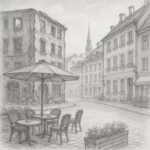This was the final stop. I was on my way home—whatever that means now. I had no souvenirs, no itinerary to show, only a bag that had grown heavier with each border crossed. Not with objects, but with emotion. A slow accumulation of memory, bitterness, small mercies, and silence.
The sun was shining. Summer had arrived. The streets were full of green light and bicycles. Birds sketched soft lines in the sky. I climbed the stairs to my room and dropped my bag with a sigh, not from fatigue, but from the quiet ending of something I didn’t yet know how to name.
My roommate was surprised to see me.
“I thought you were in the room the whole time,” she said.
“How could it be so quiet if you were traveling?”
She looked at me like I was a mystery that had escaped without permission.
She didn’t know.
That I had been in three countries.
That I had spoken with strangers who cried beside me.
That I had listened to saxophones on rivers, and slept beneath people who barely tolerated my breath.
She didn’t know I had spent nights in silence—not because I had nothing to say, but because no one wanted to listen.
We used to be in the same school, once.
But now, she’s a professor at a respected university.
Meanwhile, I had walked through the back doors of academia, only to be shown the exit.
I remembered something she told me once.
“Never choose a woman as your supervisor,” she’d said, half-joking.
I had laughed at the time, thought it was just another cynical remark.
But years later, after two separate female professors from two different universities dismantled everything I had tried to build, I understood her in a way I hadn’t before.
One destroyed my work. The other destroyed my credibility. Both smiled while they did it.
There were men in my journey too—co-supervisors, second readers—but they didn’t hold the power. They couldn’t stop what happened. They stayed silent, distant, gentle, and ultimately useless.
So that was it. That was my academic career.
I ended it not in a lab, but behind a dishwashing station, swollen with grief and sickness. My belly, larger than normal due to liver complications, became just another thing people misunderstood.
One lab refused me because they thought I was pregnant.
They never asked. Just assumed.
“Better safe than sorry,” someone said once.
As if my body was a threat.
As if my illness made me unclean.
I still remember that interview. It had taken weeks to get through all the selection rounds, all the documentation, even the criminal record check.
And in the end, none of it mattered.
What mattered was what they saw—
or thought they saw.
A body they didn’t want.
A person they didn’t trust.
I learned then what so many never speak aloud:
that academia, for all its rhetoric of equality and intellect, can be a place of quiet cruelty.
They use students for their papers, for their data, for their reputation.
And when they’re done, they forget your name.
Not even a thank you.
Only silence, or worse—gaslighting.
You become the problem.
You become disposable.
And yet, these are the people the world admires.
Professors with polished CVs.
Respected scientists.
Well-spoken keynote speakers.
People who build careers from the stolen labor of students too exhausted or too scared to speak.
I survived it.
But survival is not the same as healing.
Now, as I sit here, closing this chapter, I don’t pretend to have found peace.
But I’ve found perspective.
That matters more.
I don’t need revenge.
I don’t need an apology.
I don’t even need them to remember what they did.
What I need is to keep walking.
To keep writing.
To keep telling the truth, even when no one asks for it.
Because there are people like me—quiet, invisible, erased—who think they are alone.
They are not.
I see them.
I am them.
And if nothing else, let this story be proof that we existed.
That we tried.
That even when we were failed by institutions, by people, by power—we did not fail ourselves.
We kept our hearts open.
We kept walking, barefoot if we had to.
And we lived.
With honesty.
With wounds.
And with a kind of dignity that no system could ever give or take away.


